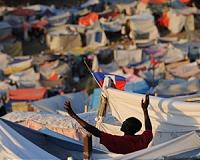| . |  |
. |
Port-Au-Prince (AFP) Jan 9, 2011 Faith is about all Haitians have left a year after an earthquake destroyed their country and on the last Sunday before the anguished anniversary, they flocked to praise God. In Port-au-Prince, hundreds of Roman Catholics attended Mass under tents erected next to the cavernous ruins of the Cathedral of Our Lady of the Assumption. Their prayers filtered through palm trees and over rubble. Men wore immaculately pressed long-sleeved shirts and the women crisp white and pink dresses, somehow kept free of the dust and dirt choking the capital. All across the city similar scenes unfolded. Later Sunday, thousands flocked to a stadium to hear an American preacher, Franklin Graham, a star in the conservative US evangelical movement. Haitians have long been known for fervent, rather idiosyncratic faith. A majority are Roman Catholic, but various Protestant churches have made strong inroads, while the deepest rooted faith here may be in voodoo. On the eve of Wednesday's anniversary of the January 12, 2010 earthquake that killed more than 220,000 people and made homeless more than a million, Haitians say they are more devout than ever. "The earthquake increased faith for many people. Many returned to their faith," said Franceeur Roland, 32, a plumber attending the open-air Mass at the cathedral. Asked what was he was praying for, Roland, wearing a white coral necklace, answered: "That this doesn't happen again." The pastel pink and white outer walls of the cathedral still stand but inside is a scene of terrifying destruction. Giant pillars lie tossed over mountainous heaps of rubble. Pieces of stained glass -- blue, red, gold -- wink from the dusty debris. Eder Charles, a gatekeeper at the cathedral complex, said the entire choir, which had been in rehearsal, was crushed and that bodies still lie under the rubble. Haiti's Catholic archbishop was among the other victims that day. Charles's prayer, he said, was for "something to change." What? "Everything. We are praying for the country to change." At the city stadium, preparations were being completed to welcome Franklin Graham, son of Reverend Billy Graham. Many Haitians have turned from Catholicism to the more participatory Evangelical movement specializing in large-scale, emotionally charged events. Beatrice J. Delievre, organizing at the stadium, said religion helped her believe that the natural disaster visited upon her country, the mass deaths, and overwhelming poverty, were not cause for despair. "If all Haitians were not killed on January 12, then there is hope. Those who died, this was their time. But for those alive, there is hope," she said. What Haitians have lost faith entirely in are the human powers of their political class. At the moment when Haiti most needs leadership, the country finds itself in yet another round of political turmoil, with candidates from a first round of presidential elections squabbling over who should enter the second round. Many here blame a lack of political vision for the inability to put Haiti back on its feet. Not only has there been almost no rebuilding, or restoration of services, but barely any of the rubble has been cleared from earthquake sites -- including the collapsed presidential palace. "Those are men and mankind is weak," Delievre, 29, said. "You can't put your trust in mankind, only in God. God can do everything."
Hapless Haiti: A timeline of misery
Share This Article With Planet Earth
Related Links Bringing Order To A World Of Disasters A world of storm and tempest When the Earth Quakes
 Terrifying rumors torment Haiti on anniversary
Terrifying rumors torment Haiti on anniversaryTabarre, Haiti (AFP) Jan 8, 2011 The latest news in Haiti's Trazeli tent camp? A new earthquake is imminent. Yes and politicians are spreading cholera. A year after nearly a quarter of a million people died in a magnitude seven earthquake, unfounded rumor is one of the few commodities Haiti has in good supply. In Trazeli, home to about 4,000 people on sun-scorched waste ground outside the town of Tabarre, three actors r ... read more |
|
| The content herein, unless otherwise known to be public domain, are Copyright 1995-2010 - SpaceDaily. AFP and UPI Wire Stories are copyright Agence France-Presse and United Press International. ESA Portal Reports are copyright European Space Agency. All NASA sourced material is public domain. Additional copyrights may apply in whole or part to other bona fide parties. Advertising does not imply endorsement,agreement or approval of any opinions, statements or information provided by SpaceDaily on any Web page published or hosted by SpaceDaily. Privacy Statement |